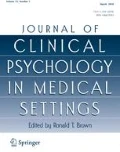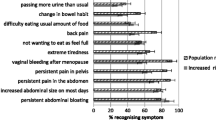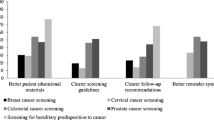Abstract
The term “teachable moment” (TM) has been used to describe a life transition or event which motivates an individual to change a behavior or presents an opportunity to intervene to prompt behavior change. We examined whether receipt of a false positive ovarian cancer (OC) screening result may represent a TM. 403 women participating in an OC screening program completed questionnaires assessing demographic, clinical, behavioral, and psychosocial information. The TM was operationalized as expressed interest in receiving health-related information. We hypothesized that among women receiving a false positive screening test result, those women who had experienced greater personal perceived risk for OC as well as distress would be more interested in receiving health-related information than women receiving a normal result. Analyses revealed that women receiving a false positive screening result were less interested in receiving health-related information than women receiving a normal screening result. For women receiving a false positive result, expressed interest in receipt of health-related information was only modestly related to distress and related even less to perceptions of OC risk. Our data do not support viewing a false positive OC screening result as a TM. Potential explanations for the current findings as well as recommendations for future research investigating the TM are discussed.

Similar content being viewed by others
References
Andrykowski, M. A., Boerner, L. M., Salsman, J. M., & Pavlik, E. (2004). Psychological response to test results in an ovarian cancer screening program: A prospective, longitudinal study. Health Psychology, 23, 622–630.
Andrykowski, M. A., & Pavlik, E. J. (2010). Response to an abnormal ovarian cancer-screening test result: Test of the social cognitive processing and cognitive social health information processing models. Psychology and Health, 1–15.
Baker, A. H., & Wardle, J. (2002). Increasing fruit and vegetable intake among adults attending colorectal cancer screening: The efficacy of a brief tailored intervention. Cancer Epidemiology, Biomarkers and Prevention, 11, 203–206.
Charlson, M. E., Boutin-Foster, C., Mancuso, C. A., Peterson, J. C., Ogedegbe, G., Briggs, W. M., et al. (2007). Randomized controlled trials of positive affect and self-affirmation to facilitate healthy behaviors in patients with cardiopulmonary diseases: Rationale, trial design, and methods. Contemporary Clinical Trials, 28, 748–762.
Demark-Wahnefried, W., Aziz, N. M., Rowland, J. H., & Pinto, B. M. (2005). Riding the crest of the teachable moment: Promoting long-term health after the diagnosis of cancer. Journal of Clinical Oncology, 23, 5814–5830.
DePriest, P. D., & DeSimone, C. P. (2003). Ultrasound screening for the early detection of ovarian cancer. Journal of Clinical Oncology, 21, 194s–199s.
Folkman, S., & Moskowitz, J. T. (2000). Positive affect and the other side of coping. American Psychologist, 55, 647–654.
Fredrickson, B. L. (2001). The role of positive emotions in positive psychology. The broaden-and-build theory of positive emotions. American Psychologist, 56, 218–226.
Fredrickson, B. L., & Losada, M. F. (2005). Positive affect and the complex dynamics of human flourishing. American Psychologist, 60, 678–686.
Freund, K. M., D’Agostino, R. B., Belanger, A. J., Kannel, W. B., & Stokes, J., I. I. I. (1992). Predictors of smoking cessation: The Framingham Study. American Journal of Epidemiology, 135, 957–964.
Ganz, P. A. (2005). A teachable moment for oncologists: Cancer survivors, 10 million strong and growing!. Journal of Clinical Oncology, 23, 5458–5460.
Gaugler, J. E., Pavlik, E., Salsman, J. M., & Andrykowski, M. A. (2006). Psychological and behavioral impact of receipt of a “normal” ovarian cancer screening test. Preventive Medicine, 42, 463–470.
Geller, A. C., Emmons, K. M., Brooks, D. R., Powers, C., Zhang, Z., Koh, H. K., et al. (2006). A randomized trial to improve early detection and prevention practices among siblings of melanoma patients. Cancer, 107, 806–814.
Gorin, A. A., Phelan, S., Hill, J. O., & Wing, R. R. (2004). Medical triggers are associated with better short- and long-term weight loss outcomes. Preventive Medicine, 39, 612–616.
Gritz, E. R., Fingeret, M. C., Vidrine, D. J., Lazev, A. B., Mehta, N. V., & Reece, G. P. (2006). Successes and failures of the teachable moment: Smoking cessation in cancer patients. Cancer, 106, 17–27.
Gritz, E. R., Nisenbaum, R., Elashoff, R. E., & Holmes, E. C. (1991). Smoking behavior following diagnosis in patients with stage I non-small cell lung cancer. Cancer Causes and Control, 2, 105–112.
Haug, K., Fugelli, P., Aaro, L. E., & Foss, O. P. (1994). Is smoking intervention in general practice more successful among pregnant than non-pregnant women? Family Practice, 11, 111–116.
Horowitz, M., Wilner, N., & Alvarez, W. (1979). Impact of Event Scale: A measure of subjective stress. Psychosomatic Medicine, 41, 209–218.
Humpel, N., Magee, C., & Jones, S. C. (2007). The impact of a cancer diagnosis on the health behaviors of cancer survivors and their family and friends. Supportive Care in Cancer, 15, 621–630.
Kelsey, K. S., DeVellis, B. M., Begum, M., Belton, L., Hooten, E. G., & Campbell, M. K. (2006). Positive affect, exercise and self-reported health in blue-collar women. American Journal of Health Behavior, 30, 199–207.
Lawson, P. J., & Flocke, S. A. (2009). Teachable moments for health behavior change: A concept analysis. Patient Education and Counseling, 76, 25–30.
Loss, R. W., Hall, W. J., & Speers, D. M. (1979). Evaluation of early airway disease in smokers: Cost effectiveness of pulmonary function testing. American Journal of the Medical Sciences, 278, 27–37.
Marks, P., & Williams, R. (2007). Alcohol-related road traffic accidents: Promoting a lower alcohol strategy. Clinical Medicine, 7, 348–350.
McBride, C. M., Emmons, K. M., & Lipkus, I. M. (2003). Understanding the potential of teachable moments: The case of smoking cessation. Health Education Research, 18, 156–170.
McBride, C. M., Pirie, P. L., & Curry, S. J. (1992). Postpartum relapse to smoking: A prospective study. Health Education Research, 7, 381–390.
McBride, C. M., Puleo, E., Pollak, K. I., Clipp, E. C., Woolford, S., & Emmons, K. M. (2008). Understanding the role of cancer worry in creating a “teachable moment” for multiple risk factor reduction. Social Science and Medicine, 66, 790–800.
McBride, C. M., Scholes, D., Grothaus, L. C., Curry, S. J., Ludman, E., & Albright, J. (1999). Evaluation of a minimal self-help smoking cessation intervention following cervical cancer screening. Preventive Medicine, 29, 133–138.
Ostbye, T., McBride, C., Demark-Wahnefried, W., Bastian, L., Morey, M., Krause, K. M., et al. (2003). Interest in healthy diet and physical activity interventions peripartum among female partners of active duty military. Military Medicine, 168, 320–325.
Taylor, K. L., Cox, L. S., Zincke, N., Mehta, L., McGuire, C., & Gelmann, E. (2007). Lung cancer screening as a teachable moment for smoking cessation. Lung Cancer, 56, 125–134.
van Nagell, J. R., Jr., DePriest, P. D., Reedy, M. B., Gallion, H. H., Ueland, F. R., Pavlik, E. J., et al. (2000). The efficacy of transvaginal sonographic screening in asymptomatic women at risk for ovarian cancer. Gynecologic Oncology, 77, 350–356.
Wardle, F. J., Collins, W., Pernet, A. L., Whitehead, M. I., Bourne, T. H., & Campbell, S. (1993). Psychological impact of screening for familial ovarian cancer. Journal of the National Cancer Institute, 85, 653–657.
Wardle, J., Williamson, S., Sutton, S., Biran, A., McCaffery, K., Cuzick, J., et al. (2003). Psychological impact of colorectal cancer screening. Health Psychology, 22, 54–59.
Acknowledgment
This research was supported by grant CA84036 from the National Cancer Institute.
Author information
Authors and Affiliations
Corresponding author
Rights and permissions
About this article
Cite this article
Floyd, A., Steffens, R.F., Pavlik, E. et al. Receipt of a False Positive Test Result During Routine Screening for Ovarian Cancer: A Teachable Moment?. J Clin Psychol Med Settings 18, 70–77 (2011). https://doi.org/10.1007/s10880-011-9226-7
Published:
Issue Date:
DOI: https://doi.org/10.1007/s10880-011-9226-7




